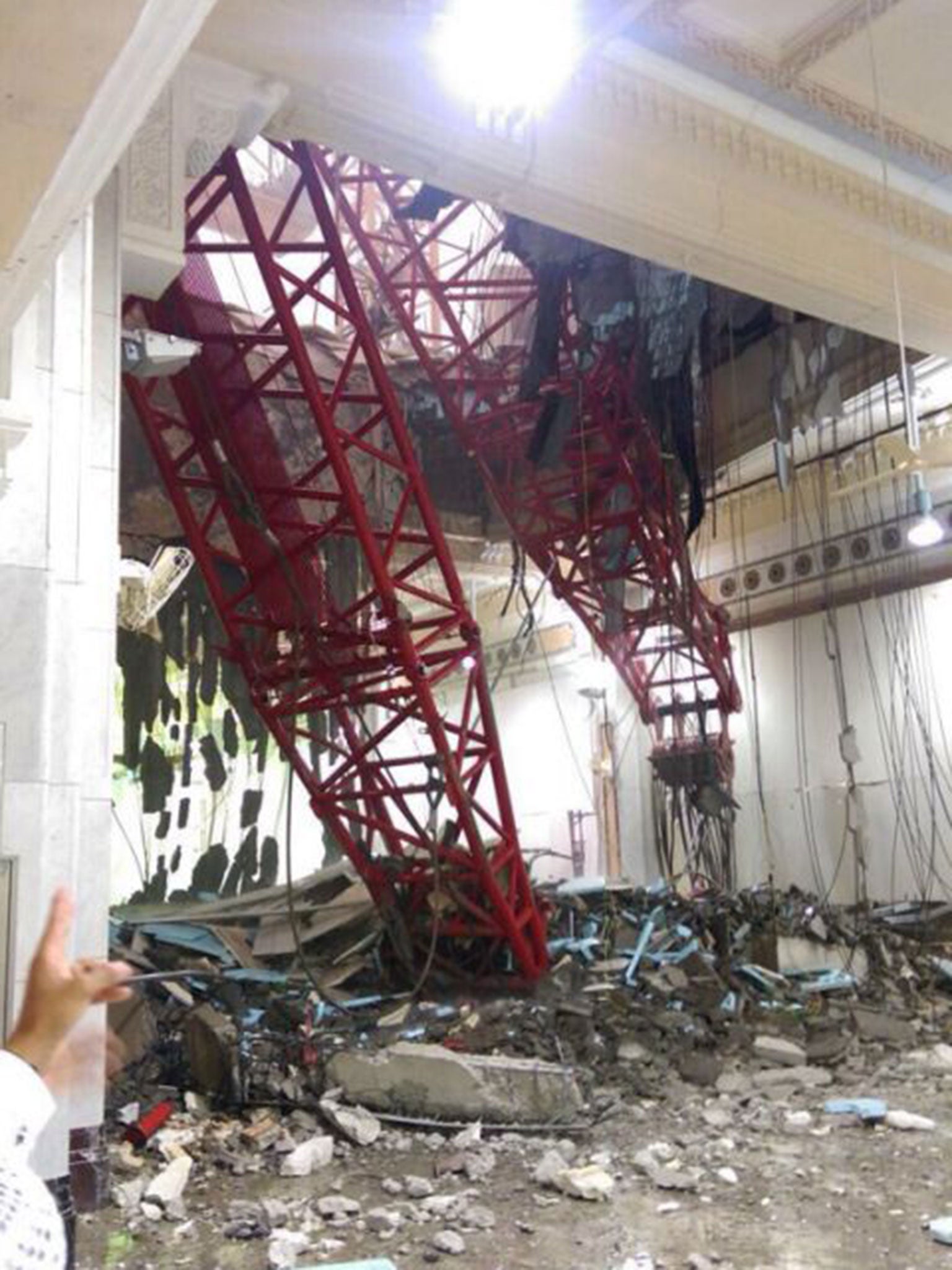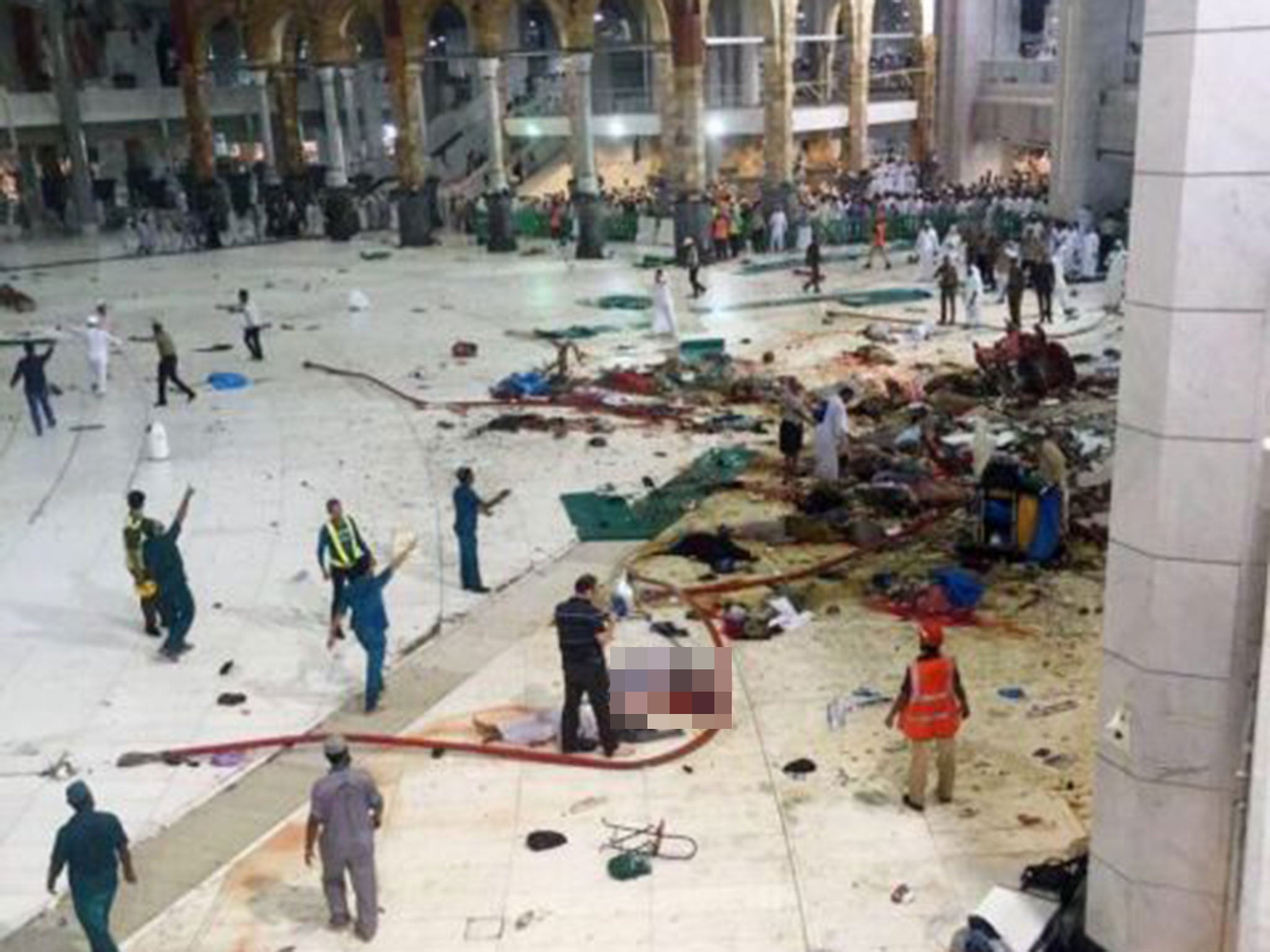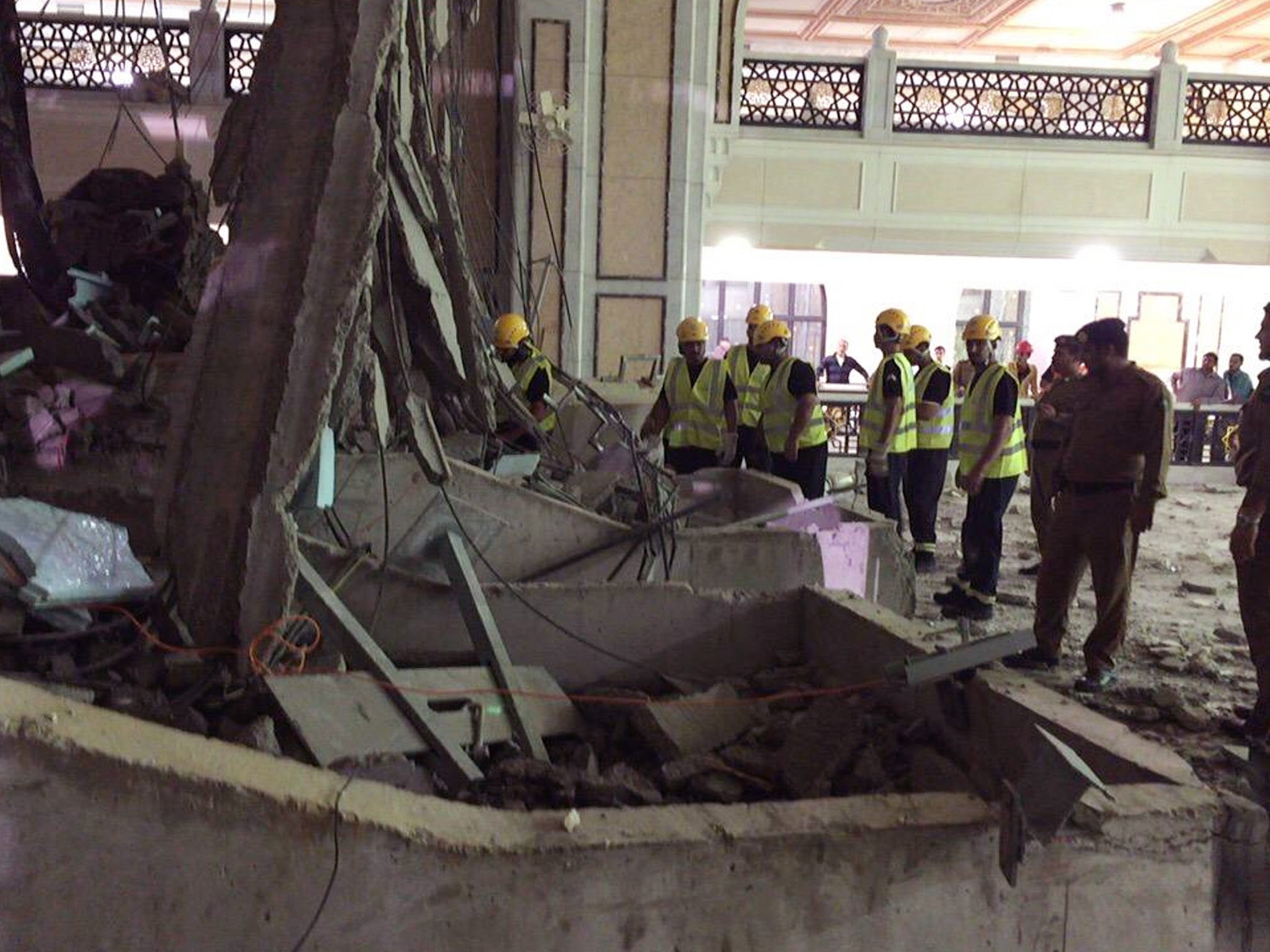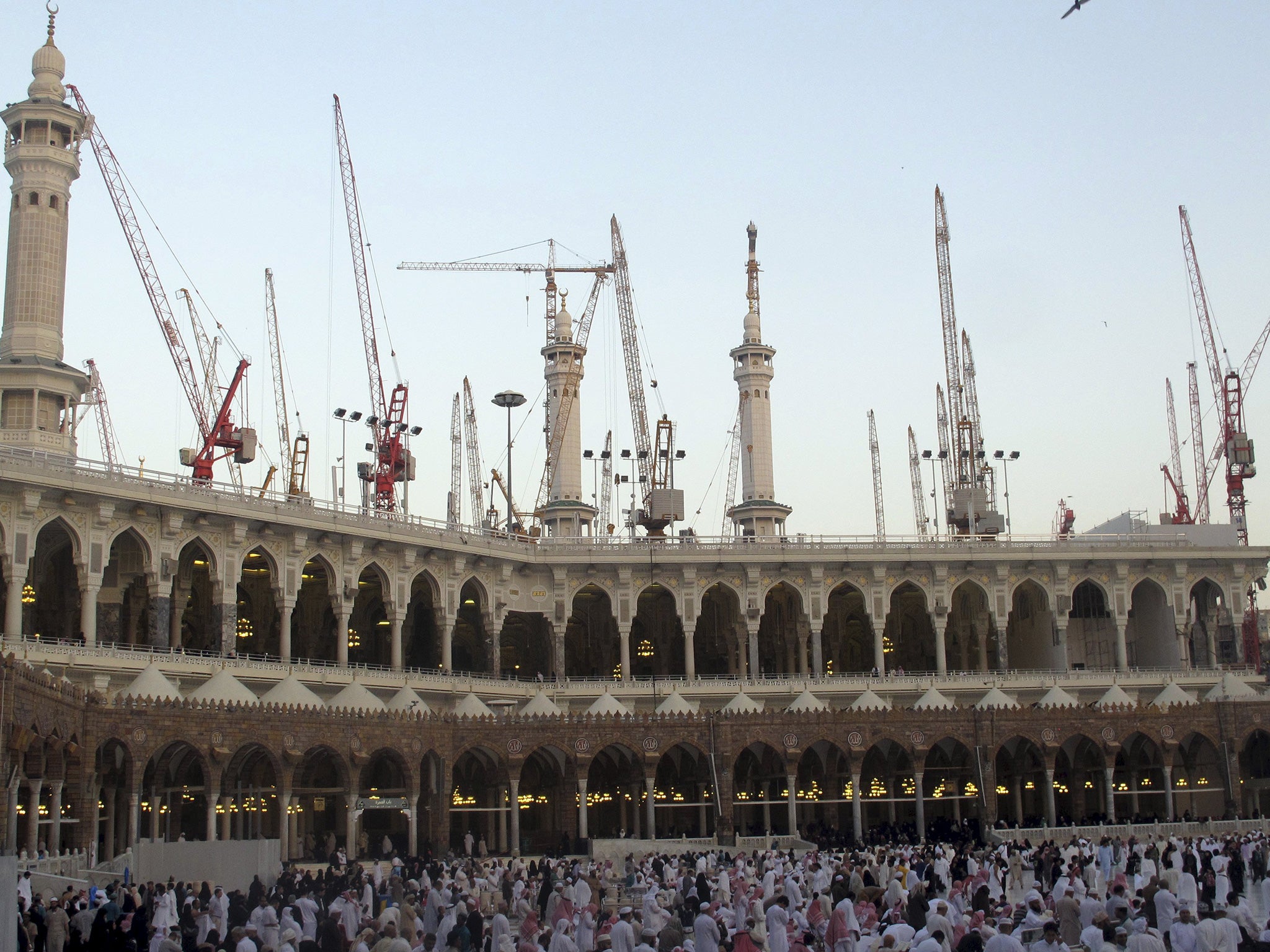Mecca crane collapse: 107 dead and at least 238 injured after crane comes down on Grand Mosque
Violent storm believed to have toppled the crane, which crashed through the roof of the religious centre

Your support helps us to tell the story
From reproductive rights to climate change to Big Tech, The Independent is on the ground when the story is developing. Whether it's investigating the financials of Elon Musk's pro-Trump PAC or producing our latest documentary, 'The A Word', which shines a light on the American women fighting for reproductive rights, we know how important it is to parse out the facts from the messaging.
At such a critical moment in US history, we need reporters on the ground. Your donation allows us to keep sending journalists to speak to both sides of the story.
The Independent is trusted by Americans across the entire political spectrum. And unlike many other quality news outlets, we choose not to lock Americans out of our reporting and analysis with paywalls. We believe quality journalism should be available to everyone, paid for by those who can afford it.
Your support makes all the difference.At least 107 people have died and at least 238 injured after a huge crane toppled over and crashed through the roof of Islam’s most holy site in Mecca.
A violent rainstorm and strong winds brought down the crane at the Grand Mosque as constructions workers were trying to make the huge complex safer for the millions of visiting Hajj pilgrims expected in the coming weeks.
Tons of rubble and debris rained down scores of people gathering in the mosque for 6.30pm prayers when a section of the crane crashed through the roof.
SCROLL DOWN FOR VIDEO

Footage showed the crane toppling towards a three-storey section of the mosque complex, before smashing into the roof.
Photographs of the disaster show a grisly scene, with police and onlookers attending to numerous bodies strewn around the polished mosque floor in pools of blood.

Other footage showed bodies and blood amid the rubble, while dazed and bloodied survivors staggering past debris in the immediate aftermath of the tragedy.
Saudi Arabia's civil defense authority provided a series of rising casualty numbers on its official Twitter account as ambulances whisked the wounded to area hospitals.

The nationalities of those caught up in the disaster were uncertain last night and the Foreign Office was making inquiries to establish if any Britons had been killed or injured. Thousands of Britons are already in Mecca or are heading there for the Hajj.
Sympathy and tributes were offered by people from around the world last night and the Muslim Council of Britain tweeted: “1000s of British people are undertaking #Hajj and we hope they are safe tonight as tragedy in #Makkah unfolds. Prayers for all the victims.”
Omer El-Hamdoon, President of the Muslim Association of Britain, said: “Our prayers are directed to those who have died that God shower them with His mercy.
"Our thoughts are with the families and friends, at this difficult time, whilst waiting for news. As we pray to God that He gives full and speedy recovery to all those injured.”
The Foreign Secretary Philip Hammond said: "I'm shocked and saddened to hear of the accident in Mecca involving a large number of fatalities amongst those attending the Hajj. My thoughts are with the families of those affected."

Ahmed bin Mohammed al-Mansouri, spokesman for the presidency of the Mecca and Medina mosque affairs, said in a statement that the accident happened during a severe storm carrying strong winds and heavy rain.
The governor of the Mecca region, Prince Khalid al-Faisal, quickly called for the formation of a committee to investigate the cause of the accident.
He directed all appropriate authorities to provide support for the injured.

The Grand Mosque - the Masjid al-Haram - contains the Kaaba, the black cube-shaped building which Muslims face when they pray wherever they are in the world and is Islam’s most sacred shrine.
Muslims are expected to perform pilgrimages to the Kaaba at least once during their lifetimes and once there they walk around it seven times anti-clockwise in a rite known as Tawaf.
The accident took place as the Grand Mosque prepared to welcome the millions of pilgrims who will gather there later this month for Islam's annual Hajj pilgrimage, one of the largest religious gatherings in the world.
The crane struck a third floor area on the eastern side of the Grand Mosque around 5.45pm, while the building was packed with the 6.30pm Friday prayers approaching. The crane’s arm crashed into the top edge of the building and, crumpling under its own weight, the top section smashed down into the roof.
Several cranes surround the mosque to support an ongoing expansion and other construction work that has transformed the area around the sanctuary.

The $60 billion redevelopment is being carried out by the Saudi Binladin Group - owned by Osama Bin Laden’s family.
In the past, Hajj at Mecca has been the scene of tragedies including stampedes which left many pilgrims dead - in 2006 several hundred people died in a stampede.
The huge complex covers more than 88 acres and includes indoor and outdoor prayer areas. It is open 24-hours a day.
Steep hills and low-rise traditional buildings that once surrounded the mosque have in recent years given way to shopping malls and luxury hotels — among them the world's third-tallest building, a giant clock tower that is the centerpiece of the Abraj al-Bait complex.
The Binladin family - also built the Abraj al-Bait project - has been close to the ruling Al Saud family for decades and oversees major building projects around the country.
The project to expand Mecca’s Grand Mosque was launched in 2011 by the late King Abdullah bin Abdulaziz.
In July, King Salman bin Abdulaziz announced a further five projects to increase the capacity of the complex, including more tunnels and squares.
Eventually the development is expected to double the area around the Kaaba for pilgrims, enabling the number who take part to rise from three million annually to seven million by 2040.
Security services often ring Islam's sacred city with checkpoints and other measures to prevent people arriving for the pilgrimage without authorization, and last year the number of pilgrims was restricted as a safety measure because of the construction work.
Join our commenting forum
Join thought-provoking conversations, follow other Independent readers and see their replies
0Comments